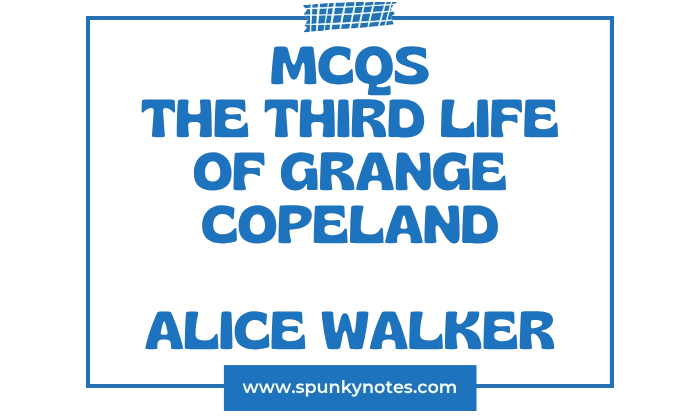

Estimated Reading Time: 20 min
The Third Life of Grange Copeland MCQs
1. What model of car did Uncle Silas drive?
A. Ford
B. Buick
C. Cadillac
D. Chevrolet
2. Why did Brownfield feel embarrassed about the road?
A. It was too dusty
B. It damaged the car
C. It was too winding
D. It had police patrols
3. What job did Margaret (Brownfield’s mother) do for ready money?
A. Picking cotton
B. Pulling baits
C. Cleaning houses
D. Weaving baskets
4. How did Brownfield’s cousins describe his father’s work situation?
A. He owned the farm
B. He worked for a cracker
C. He was his own boss
D. He was traveling
5. What condition did Brownfield develop from eating garden tomatoes?
A. Stomach ulcers
B. Tetter sores
C. Tomato sores
D. Blurry vision
6. Why did Brownfield think his father’s face froze when the truck arrived?
A. Fear of the noisy truck
B. Hatred of the white man
C. Exhaustion from work
D. Pain from drinking
7. What did the driver, Mr. Shipley, smell like when he spoke to Brownfield?
A. Mint
B. Whiskey
C. Sweat
D. Cotton dust
8. What did Grange say he ought to do to Brownfield when he was drinking?
A. Send him North
B. Buy him a toy
C. Throw him down the well
D. Teach him plowing
9. Why did Margaret say she didn’t go North with her sister Marilyn?
A. She loved Grange
B. She knew nothing of the North
C. She feared Silas
D. She stayed in school
10. What was Margaret’s opinion of her sister Marilyn’s appearance in the North?
A. Beautiful
B. Bleached up like a streetwalker
C. Rich
D. Healthy
11. What was the cycle of Grange’s mood by Thursday night?
A. Morose
B. Gloomy peak
C. Happy
D. Stupefied
12. What did Grange do on Saturday night that forced Margaret and Brownfield to hide?
A. Drove the wagon
B. Stumbled home drunk and shot his shotgun
C. Fought the neighbors
D. Went to town
13. What did Brownfield observe about their house’s structure?
A. Painted white
B. Sway-backed animal
C. Too large
D. Very new
14. What was the signal that Grange gave up on repairing the house or a dream?
A. Crying
B. Shrug
C. Angry silence
D. Drinking
15. What did Brownfield’s cousin Angeline accuse Grange of wanting Margaret to do?
A. Divorce him
B. Sell herself
C. Start drinking
D. Move to Chicago
16. What object did Brownfield use to polish his new shoes in his daydream?
A. Silk cloth
B. His father’s old shirt
C. A special wax
D. A soft brush
17. What two women’s faces constantly interchanged as Brownfield’s wife in his daydream?
A. Mem and Josie
B. Nettie and Celie
C. His wife and the cook
D. Margaret and Marilyn
18. What job was Brownfield’s imaginary chauffeur’s wife highly respected for?
A. Teaching
B. Cooking
C. Cleaning
D. Sewing
19. How did Grange react when Brownfield moved toward his hand while pretending to sleep?
A. He touched him gently
B. He drew back his hand
C. He woke him up
D. He left the room
20. Why did Brownfield hate Grange after the night of the failed touch?
A. Grange was silent
B. Grange could not bear to touch his son
C. Grange had left home
D. Grange was too old
21. What was Brownfield’s major internal conflict regarding Mem?
A. Her superior education
B. Her family ties
C. Her beauty
D. Her kindness
22. What did Brownfield want Mem to do instead of talking “proper”?
A. Remain silent
B. Talk like a hopeless nigger woman
C. Learn Spanish
D. Use smaller words
23. What was Mem’s big dream that Brownfield sabotaged?
A. Writing a book
B. Buying a house
C. Starting a school
D. Moving North
24. What was Mem forced to do to please her husband regarding her speech?
A. Learn to read
B. Revert to her old dialect
C. Speak in rhymes
D. Stop speaking entirely
25. What poisonous chore did Brownfield make his daughter Daphne perform at age five?
A. Pick cotton
B. Hand-mop cotton with arsenic
C. Work in the dairy
D. Clean the house
26. What activity did Brownfield take up for fun to release his frustration?
A. Gambling
B. Killing cats and fish
C. Drinking only
D. Hunting deer
27. What did Mem realize about herself after being threatened with the gun?
A. She was a coward
B. She was not meant to fight
C. She had let Brownfield play man long enough
D. She was in love
28. What final commitment did Mem make before Brownfield violently attacked her?
A. She signed a lease on a house in town
B. She was moving to Mr. J.L.’s place
C. She was moving in with Josie
D. She was leaving the county
29. What job did Mem eventually get in town to support the family?
A. Factory worker
B. School teacher
C. Domestic maid
D. Waitress
30. What was Brownfield’s reasoning for killing Mem after she lost her plumpness?
A. She became skinny
B. She became too strong
C. She was cheating
D. He hated her pride
31. What was the name of the woman who owned the juke joint?
A. Lorene
B. Fat Josie
C. Mary Agnes
D. Sister Madelaine
32. What relationship did Josie have with Brownfield’s father, Grange?
A. They were old enemies
B. They were former lovers
C. They were cousins
D. They were business partners
33. What was the ultimate motivation behind Josie sleeping with Brownfield?
A. She liked him a lot
B. To make Grange jealous, hoping to kill him
C. She needed the money
D. She wanted a big man
34. What was Josie’s daughter, Lorene, known for?
A. Singing
B. Expert use of the razor
C. Cooking
D. Teaching
35. Why was Grange pushed into marrying Margaret instead of Josie?
A. He loved Margaret more
B. Margaret was wealthy
C. His family wanted respectability
D. Josie refused marriage
36. What caused Josie’s recurring violent dreams?
A. Indigestion
B. Shame
C. Being ridden by her father
D. Fear of the police
37. What was Josie’s father doing when he forbade anyone to help her after she fell?
A. Sleeping
B. Preaching
C. Standing over her with his foot pressed down
D. Drinking too much
38. What did Brownfield realize about his father’s feeling toward Ruth?
A. He was indifferent
B. He was afraid of her
C. He loved her totally
D. He was planning to leave her
39. What kind of creature did Brownfield compare Josie to in her relationship with him?
A. A cat
B. A cow
C. A pig
D. A whore
40. What did Josie sell to help Grange pay for their farm?
A. Her car
B. Her savings
C. The Dew Drop Inn
D. Her jewelry
41. How did Ruth eventually learn Brownfield had been trying to read her school book?
A. She saw him reading it
B. He threw the book at her
C. Grange told her
D. Mem told her
42. What item did Mem carry the night she was killed?
A. A gun
B. A shovel
C. Packages, including oranges
D. Her purse
43. Why did Grange forbid Ruth to ride on the back of the cotton truck to town?
A. It was too dangerous
B. She was too young
C. Field hands did it
D. Josie complained
44. What event led Grange to agree to join the Baptist church as a boy?
A. He saw the Holy Ghost
B. He saw a fly swallowed by his uncle
C. He heard the preaching
D. His mother cried
45. What was the crime Grange committed in New York that he felt liberated him?
A. Stealing money
B. Killing a pregnant white woman
C. Selling drugs
D. Killing a policeman
46. What did Grange discover in the North that was crueler than the South’s disdain?
A. Extreme cold
B. High cost of living
C. Invisibility
D. Constant violence
47. What was Grange’s ultimate teaching to the black community in Harlem?
A. Save money
B. Teach them to hate
C. Go back South
D. Join the army
48. What did Grange observe about Dr. King that made him respect him as a man?
A. His education
B. His singing
C. His gentleness with his family
D. His courage to march
49. What did Grange say was the cause of black people’s souls spoiling?
A. Poverty
B. Lack of education
C. Being forced to forgive oppression
D. Drinking liquor
50. What name did Grange use for the white judge who gave Brownfield custody of Ruth?
A. Judge Harry
B. Mr. Smith
C. Justice
D. Old fool
Brief Overview
Brownfield Copeland was a young boy in Georgia. His father, Grange, was silent and often drunk. His mother, Margaret, was poor and submissive to Grange. She worked pulling fishing baits to earn money.
Brownfield’s cousins visited from the North. They teased him that his father was “owned” by a white man named Shipley.
Margaret grew unhappy with her life. She began dating and eventually had a baby, Star, with another man. Grange became jealous and increasingly silent. One night, Grange left the family and went North. Margaret became desperate and poisoned herself and Star in the clearing.
Brownfield moved away after his mother’s funeral. He eventually married a good woman named Mem. Brownfield’s debt grew yearly. He became abusive and beat Mem weekly, blaming her for his failures. He forced her to move to a poor shack and stole her money.
Mem finally stood up to Brownfield. She got a job and leased a clean house in town. Brownfield was furious. He refused to move and instead moved them to a dirty, hay-filled house on Mr. J. L.’s property.
Brownfield accepted a bribe. He refused to pay rent on the city house. Mem became ill and was unable to keep her job. Brownfield moved his family to a worse shack. Mem recovered and planned to leave him. Brownfield murdered Mem at their home because she would not submit to him. He was sentenced to prison.
Grange returned home after Mem’s death. He took his granddaughter, Ruth, to live with him. Grange, now reformed, raised Ruth on a quiet farm. He taught her independence and self-respect. Brownfield was paroled. He tried to reclaim Ruth from Grange. In court, Grange shot Brownfield dead to protect Ruth. Grange sacrificed his freedom so Ruth could survive.


